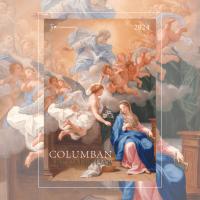
Columban Fr Peter Hughes (left) with some participants of the Synod. Photo: Amy Echeverria
Science and faith came together during the Synod on the Amazon,” Fr Peter Hughes, a Columban delegate to the Synod on the Amazon held in Rome during October this year, says.
Fr Hughes arrived in Rome with a long experience as a Columban missionary in Peru, which along with Brazil is one of the two largest territorial stakeholders in the Amazon Basin. He describes one of the primary purposes of the Synod as bringing the fragile situation of the indigenous peoples of the Amazon and their environment into the world spotlight.
A delegation from the Pan-Amazonian Ecclesial Network (a body of the Latin American Bishops’ Conference) to the European Union in September 2018 expressed the frustration of the indigenous peoples at successive government bodies, both local and international, continuously raping the Amazon Basin of its natural resources and wealth.
However, Fr Hughes says that the Synod is about a lot more than simple economics. Pope Francis believes that as the 'Lung of the Planet', the Amazon is of fundamental importance to the health of the entire world and demands a global ecological conversion to affect a turn away from relentless consumption and the restoration of a proper relationship with the earth.
He began this call with the publication of his 2015 encyclical, Care for our common home (Laudato Si’), which Fr Hughes notes formed the starting point for the conversation in Rome. However, he points out that the Synod is but part of the follow-up to the encyclical, not an end in itself. It is one step in a call to the world to engage in this vital conversation and work towards forming an ordered, life-giving relationship with the earth.
This, he notes, calls for radical change in the worldview of peoples, organisations and governments the world over. The Synod describes an across-the-board challenge as moving away from colonial attitudes that emanate from a central source of power, and bringing the people currently being pushed to the peripheries into the centre of information gathering and decision-making processes.
This requires attentive listening to voices traditionally ignored; it also requires a radical shift in the ways of the Church, something that Fr Hughes says was well modelled in the process of the Synod.
He points out that the real life of the Synod began well over one year ago with 45 gatherings conducted in different language groups throughout the territory covered by the Amazon Basin.
Each one involved around 200 people, but in addition there was a whole series of gatherings around thematic issues; including the situation of women, children and the struggling frontier communities. All up, some 87,000 voices were recorded.
“By far the clearest voice came from the people of the Amazon; women and indigenous leaders, giving them a new moral authority and clarity,” Fr Hughes says. The challenge to the bishops was to echo the voice of the people, not to speak for them.
This Fr Hughes describes as the fundamental push of the papacy of Pope Francis. He adds that the functioning of the gathering in Rome was a fine example of what the pope means by a Synod, a body that listens rather than teaches.
What can be considered one of the most important breakthroughs in this Synod was the largest ever presence of women on the floor of a top-level Church meeting. In a way reminiscent of the Labour Party slogan, “It’s time,” from the 1972 election in Australia, it is good to recall the words of Pope Paul VI eight years earlier.
“The hour is coming and in fact has come, when the vocation of women is being achieved in its fullness, the hour at which the woman acquires in the world an influence, an effect and a power never hitherto achieved.”
The final document from the Synod gives resonance to Pope Paul’s call, noting the need for a stronger role for women, who in many parts of the Amazon have carried the responsibility of keeping the Church alive.
It was also apparent at the Synod that one of the strongest forces in caring for the territory of the Amazon is the indigenous women, who have stood up to cashed-up international companies offering money for projects that would serve to destroy fragile eco-systems. Fr Hughes describes these women as the most significant voice at the Synod.
He presents the Synod as putting issues on the table detailing a physical destruction of this vital natural resource and seeking solutions from the lived experience of the people who inhabit the area, not those who seek to impose from afar.
He describes this as the point where science meets faith. Science tells us this is a time with a sense of countdown. The forests are burning in a way they have not burned before and the Amazon is hell-bent towards destruction.
Faith calls for a search for a new wisdom, not one rehashed from the past. Science has its own solutions, but faith has a power to discern and inspire human response.
The imperative is for new ways of doing things. The Synod suggests the ordination of married men and special ministries for women, as well as a deeper theology of creation and the embedding of the word of God in culture.
Its call is to consider these things within the ancestral wisdom of once ignored peoples. The big challenge is to listen.
Columban Fr Jim Mulroney is the former Editor of the ‘Sunday Examiner’ in Hong Kong and now resides at the Columban house in Essendon.
Listen to "Where science meets faith"
Related links
- Read more from The Far East, January/February 2020

